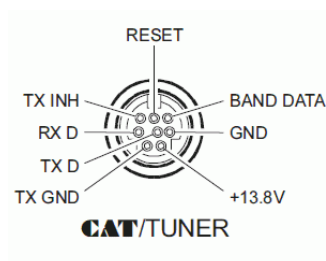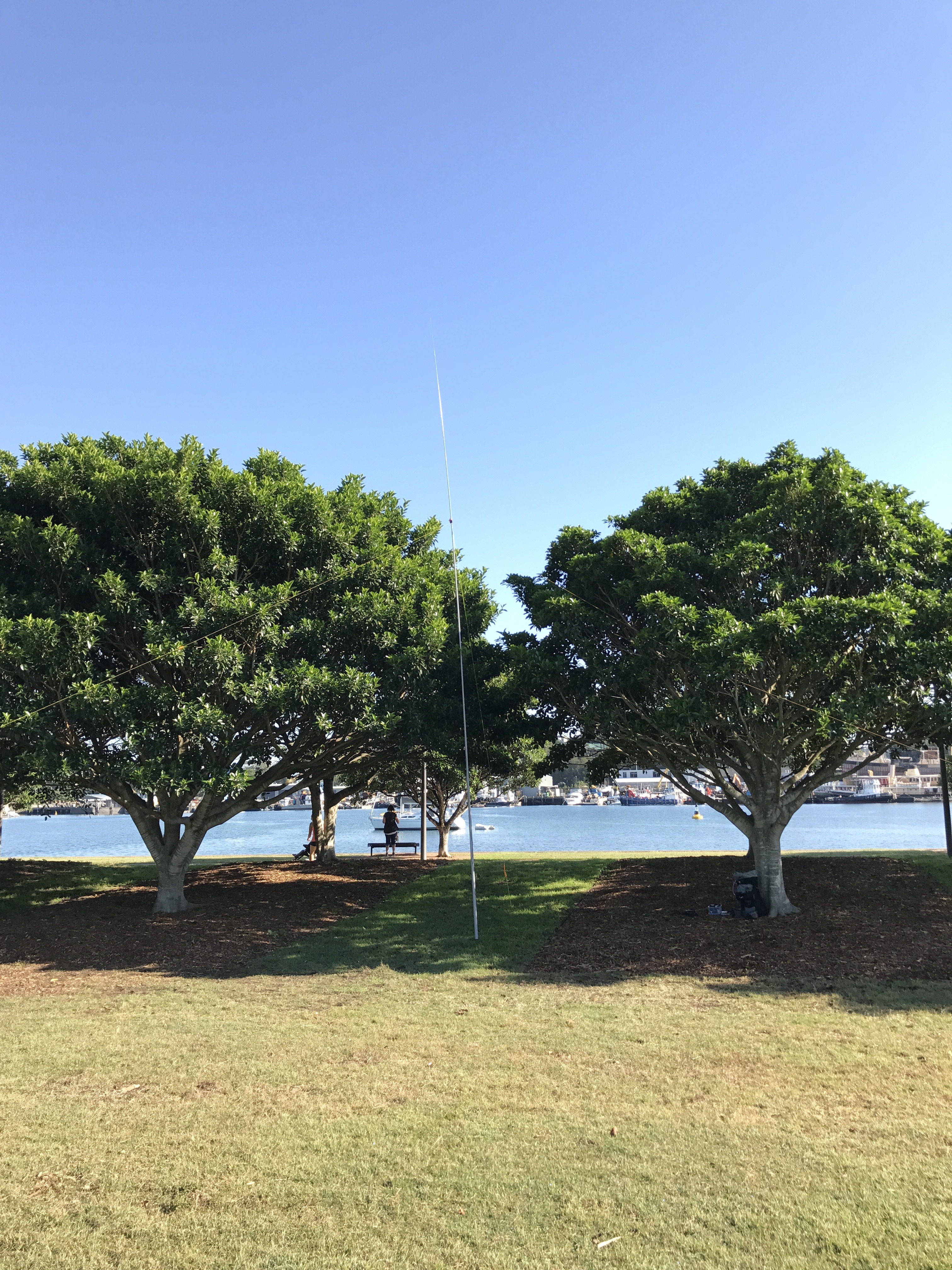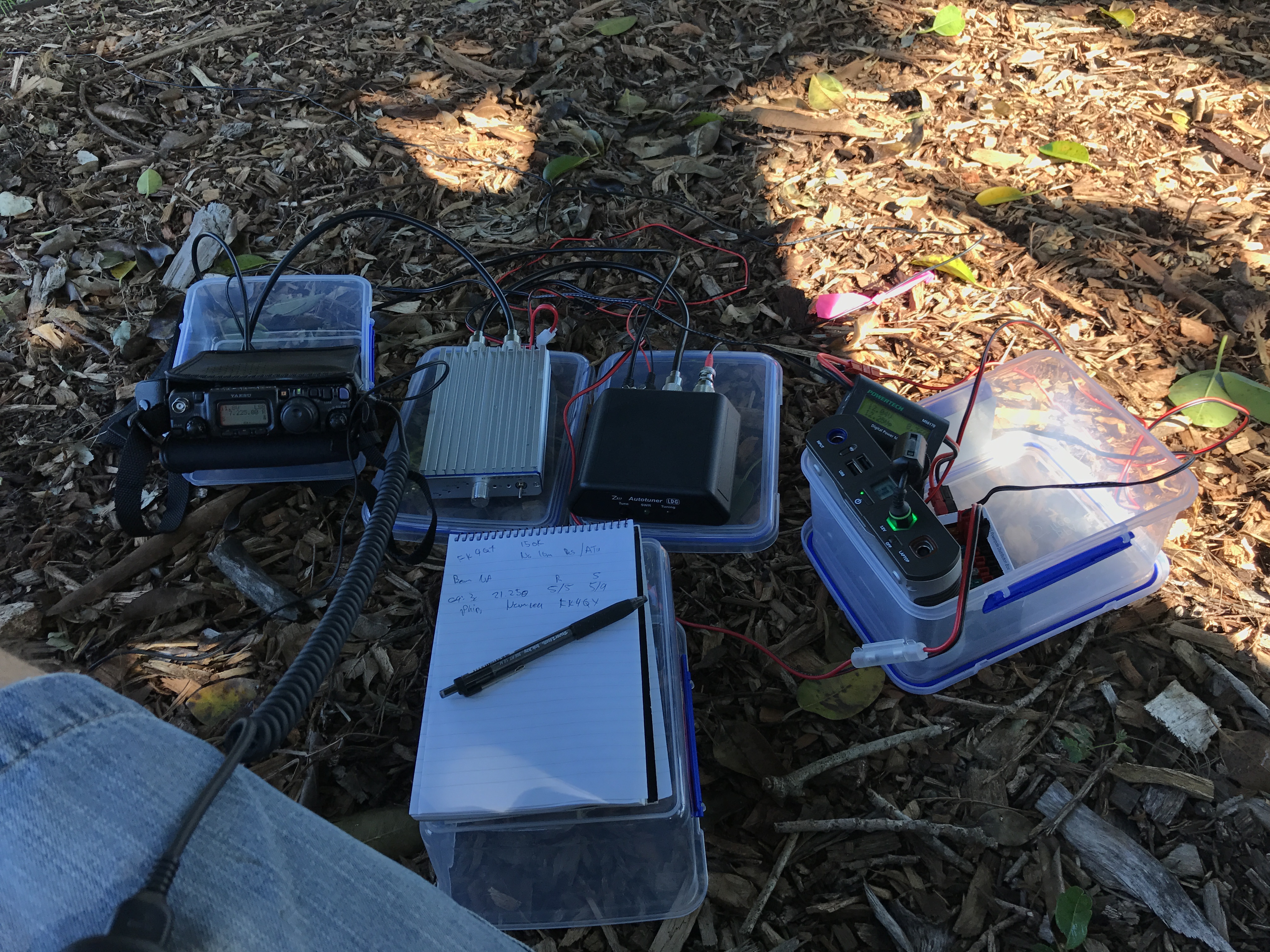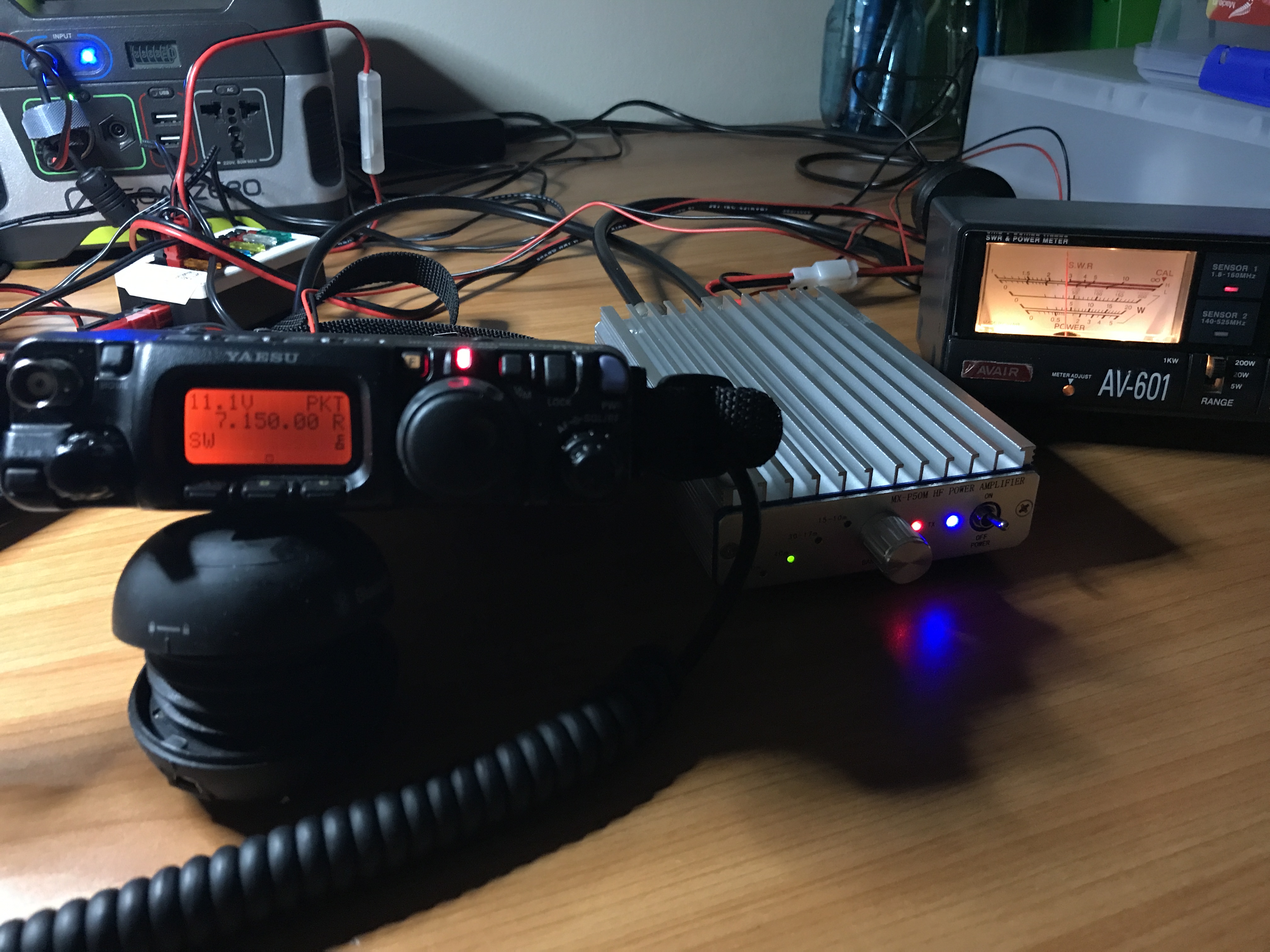Ahoy!
After working QRP only for a few months I opted to drop the purist aspect on that front. After talking with some locals and reading VK2QR’s write up with interest I took the plunge and ordered a MX-P50M fresh from ebay.
Being somewhat under prepared for AusPost to deliver before Easter I was surprised to have the amplifier delivered with perfect timing. I quickly asked around and was lent a 60W dummy load and an Avair AV-601 from Tony VK2KZ. Now armed with the required test equipment to not burn out my poor Z817 tuner I started soldering up the power poles and control lead. For the FT-817ND control lead I used the pinout schematics again from VK2QR. In case hosting related things go awry in future I’ve extracted the pinout diagram here.

Testing Setup
While its far from completely scientific, these results are a step in the right direction. While I can’t validate the unit I have particularly there is a incredibly detailed write up by GM4SLV on the amplifiers RF performance. If you’ve made it this far and are waiting for “YES BUT LOOK IMD” go read Johns write up, I am not covering that.
The details I was looking for however have more to do with my choice of power. Unlike most SOTA activators carrying Lithium battery packs up the hills I’ve been using a Goal Zero Sherpa 100 (ok its still Lithium). But the little box includes a 12v regulator fused for 10A along with a 5V USB feed and support for Solar, DC or AC charging. Its a neat package but needs a bit of consideration, on the other hand it doesn’t look like a bomb and has high wife approval factor for camping related power needs so its a win-win / least bad choice!
Here is some fabulous 1 minute ASCII art of the test environment.
+------------------+ +----------+ +-----+
RF | | | | | |
| | | | | |
+ + + + + +
FT-817ND MX-P50M AV-601 60W Load
+ +
| |
DC | +------------------+
| |
| |
+ +
WARS Power Pole Dist
+
|
|
+
In-line DC meter
+
|
+
Goal Zero
Or for the visually inclined here is a photo while testing 40M at 5W input RF.
Initially I was powering the rigs using a bigger, heavier Goal Zero unit (Yeti 150) which was AC connected. I only clicked as I almost completed the testing that this was not going to replicate SOTA conditions. So you see data for both a mostly stable 13.8v power supply as well as a second table where I switched to testing with the Sherpa 100 on internal battery.
The difference between the two power supplies is mostly that the Yeti 150 is NIMH SLAB type with ~150Wh while the Sherpa 100 is a LiPo pack and 98Wh.
Needless to say I only recorded detailed voltage supply for the battery powered test.
Testing Data
Yeti 150 + AC charging
| Band | Frequency | Mode | In RF watts | Out RF watts | In Amps |
|---|---|---|---|---|---|
| 10 | 28.85 | PKT | 0.5 | 7 | 4.26 |
| 15 | 21.225 | PKT | 0.5 | 9 | 3.85 |
| 20 | 14.175 | PKT | 0.5 | 8 | 3.8 |
| 40 | 7.15 | PKT | 0.5 | 8.5 | 3.9 |
| 80 | 3.6 | PKT | 0.5 | 8 | 3.95 |
| 10 | 28.85 | PKT | 1 | 15 | 5.75 |
| 15 | 21.225 | PKT | 1 | 18 | 5.2 |
| 20 | 14.175 | PKT | 1 | 17 | 5.2 |
| 40 | 7.15 | PKT | 1 | 18 | 5.4 |
| 80 | 3.6 | PKT | 1 | 17 | 5.4 |
| 10 | 28.85 | PKT | 2.5 | 26 | 7.52 |
| 15 | 21.225 | PKT | 2.5 | 29 | 6.38 |
| 20 | 14.175 | PKT | 2.5 | 26 | 6.4 |
| 40 | 7.15 | PKT | 2.5 | 26 | 6.6 |
| 80 | 3.6 | PKT | 2.5 | 29 | 6.7 |
| 10 | 28.85 | PKT | 5 | 35 | 8.6 |
| 15 | 21.225 | PKT | 5 | 35 | 7.2 |
| 20 | 14.175 | PKT | 5 | 30 | 7.3 |
| 40 | 7.15 | PKT | 5 | 30 | 7.3 |
| 80 | 3.6 | PKT | 5 | 39 | 7.6 |
Sherpa 100 Internal Battery
| Band | Frequency | Mode | In RF watts | Out RF watts | In Amps | TX voltage | RX voltage |
|---|---|---|---|---|---|---|---|
| 10 | 28.85 | PKT | 0.5 | 7 | 4.29 | 11.16 | 12.09 |
| 15 | 21.225 | PKT | 0.5 | 9 | 3.86 | 11.16 | 12.06 |
| 20 | 14.175 | PKT | 0.5 | 8 | 3.83 | 11.15 | 12.03 |
| 40 | 7.15 | PKT | 0.5 | 9 | 4 | 11.13 | 12.02 |
| 80 | 3.6 | PKT | 0.5 | 8 | 3.98 | 11.14 | |
| 10 | 28.85 | PKT | 1 | 15 | 5.7 | 10.92 | 12.03 |
| 15 | 21.225 | PKT | 1 | 17 | 5.08 | 11.03 | 12.02 |
| 20 | 14.175 | PKT | 1 | 16 | 5.07 | 11.02 | 12.03 |
| 40 | 7.15 | PKT | 1 | 17 | 5.29 | 10.99 | 12.03 |
| 80 | 3.6 | PKT | 1 | 17 | 5.37 | 10.95 | 12.03 |
| 10 | 28.85 | PKT | 2.5 | 25 | 7.05 | 10.66 | 12.03 |
| 15 | 21.225 | PKT | 2.5 | 26 | 6.14 | 10.78 | 12.03 |
| 20 | 14.175 | PKT | 2.5 | 24 | 6.17 | 10.78 | 12.03 |
| 40 | 7.15 | PKT | 2.5 | 25 | 6.26 | 10.76 | 12.03 |
| 80 | 3.6 | PKT | 2.5 | 27 | 6.45 | 10.82 | 12.03 |
| 10 | 28.85 | PKT | 5 | 30 | 7.94 | 10.54 | 12.09 |
| 15 | 21.225 | PKT | 5 | 30 | 6.91 | 10.82 | 12.09 |
| 20 | 14.175 | PKT | 5 | 30 | 7 | 10.81 | 12.09 |
| 40 | 7.15 | PKT | 5 | 30 | 7 | 10.79 | 12.04 |
| 80 | 3.6 | PKT | 5 | 31 | 7.22 | 10.73 | 12.04 |
On Air
So I set off this morning to entertain the inner Sydney morning dog walkers by taking my new SOTA pack off to Blackwattle Bay to get some clear space for the inverted-V. The goal was to test a few things;
- At JMFD 2017 we had great success using this antenna with VK2KZ’s digital station and tuner across most bands. I hadn’t thought of this before so wanted to see what the LDG Z817 would tune to
- Test the amplifier and get on-air signal reports
- Let the blue smoke out before I find myself on top of a hill doing it live.
Here is the setup for the morning.


For those that miss my scrawl in the log, just prior to this photo I made a contact with FK4QX on 15 meters at ~20w after I answered a CQ DX call. There was some initial difficulty with Philippe’s beam pointing to NA rather than VK but with a 5/5 report I was happy with that.
In fairness - this morning propagation on the higher bands did seem more forgiving. Andrew VK1AD/P wrote up his SOTA activation with a NA contact at 5w on 17m.
Never the less the little MX-P50M has made a welcome addition to the SOTA pack while the longer term options of learning CW and upgrading to an Advanced license take a bit more time!
